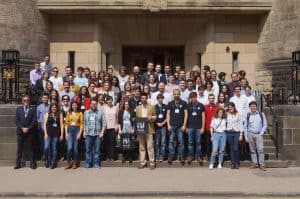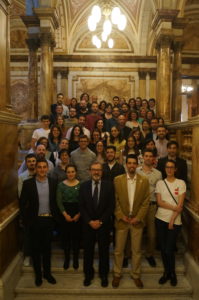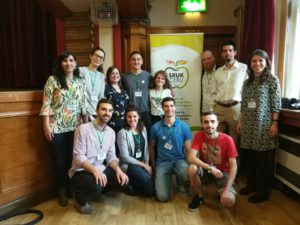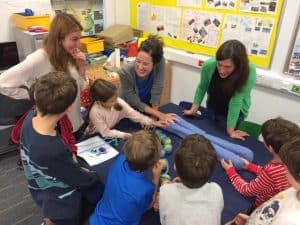- The Society of Spanish Researchers in the United Kingdom (SRUK/CERU), with more than 650 members, celebrates in Glasgow (Scotland) its VI International Symposium with social sciences and engineering as protagonists.
- This symposium offers a journey from our roots as a species to the expectations opened by scientific advances in engineering involving the daily use of robots, new materials to nanoscience and ultra-fast travel.
- A hundred Spanish and Scottish researchers join the symposium, that also celebrates a Science Festival open to the public on Sunday the 3rd of June.

Attendees to the VI SRUK/CERU International Symposium in Glasgow. Picture by Michal Rogala
Glasgow 2nd of June 2018. The Society of Spanish Researchers in the United Kingdom (SRUK/CERU) celebrates this weekend its VI international symposium “Back to the Future”, the first one held outside London. The city of Glasgow hosts this event for the first time, with a welcome reception in the City Chamber, with the presence of Bailie Annette Christie as representative of the city and the Consul General of Spain, Mr. Ricardo Martínez Vázquez.

Attendees to theReception in Glasgow City Chambers. Picture by Michal Rogala
At the meeting, around a hundred researchers have participated in a journey of scientific advances that covers from our origins in Atapuerca to the most advanced applications of engineering. This symposium opens the door to interdisciplinary and international collaborations.Attendees to the symposium travelled to the origins of the first Europeans by the hand of Prof. José María Bermúdez de Castro, one of the three directors of the Atapuerca archeological site. “What makes Atapuerca site so special is that it covers the entire history of the settlement of Europe allowing us to follow the human evolution in Europe. This is unique”. The history of the human evolution of the continent can only be written with Atapuerca in mind”. The fascinating story of the discovery and identification of the remains of King Richard III has centred Prof. Kevin Schurer (University of Leicester) lecture, who highlights “working as part of an interdisciplinary team which included archaeologists, an engineer, a geneticist, pathologists and others was a privilege and a huge learning opportunity. It is quite rare for such a diverse range of discipline to come together and work on a single project—each bringing specialist knowledge, experience and complementary skills—but there again, it is not every day that you discover a King”
Dr Blanca Ochoa, and Dr Xurxo Ayán from the University of the Basque Country have discussed with Prof Gabriel Moshenska (University College of London) about the reopening of the Altamira site to the public, where the importance of their long-term preservation against the possible opening raises passions. Xurxo stressed that “I would call attention to the fact that any decision made about the visit regime of Altamira is political in nature, because all decisions that refer to heritage assets are”.
The symposium also has included talks related to advances in engineering to improve transportation or the use of robots and artificial intelligence in our daily lives. The developers of the Hyperloop, Javier Arroyo and Manuel Martínez from the Polytechnic University of Valencia, emphasized “the future of transportation involves not only reducing distances around the globe, but doing so efficiently and environmentally friendly”. On the other hand, Prof. Ruth Aylett, an expert in robotics from the Heriot Watt University, remarked how ”much of the panic about robot capabilities now or in the immediate future assumes researchers have solved problems we are nowhere near solving. Robot batteries last between half an hour and about four hours – so if they are going to take over the universe they need to get it done in about one morning!” Healthcare-related topics were also addressed, with Prof Lizz Tanner (University of Glasgow) considering the methods of manufacturing devices that can bond with bone and either remain in situ for the rest of the patient’s life or degrade allowing natural tissue to take over the function of the implant.
There have been references to the role of women in science, reflected in the presentation by Prof. Patricia Fara (University of Cambridge), who highlighted how “inherited prejudices continue to limit the scientific opportunities of women”. The policy of international collaboration within Europe after Brexit is of particular concern to the scientific community and, as Prof Cummings (University of Glasgow) has recalled “international collaboration is vital to UK research, and Spain offers excellent opportunities to work with outstanding researchers”.

Part of the New Board of Directors. Left to right in the back: Nerea Alonso, roving director; Rocio Gaudioso, Vice-president, Maria Barreira, Online Dpt; Lorenzo de la Rica, London; Alba Lopez, treasurer; Mario Gonzalez, Scotland, Javier Escudero, president, Carmen Sánchez, Oxford. Front row: Sergio Pérez, Science Policy, Sara Avira, International Dpt, Jacobo Elíes, Yorkshire, Iñigo Urrutia, SouthWest.
In the words of Dr. Estrella Luna Diez, president of SRUK/CERU, “This symposium has marked a new success for us, since it is the first one outside London and still has attracted more than a hundred participants interested in promoting the interdisciplinarity and the development of new ideas “.
The symposium continued on Sunday with the celebration of the “Science Zone”, a science festival open to the public at the Glasgow University Union.
At the annual meeting of the Society, SRUK’s board of directors was partially renewed. Dr. Javier Escudero and Dr. Rocío Gaudioso were appointed president and vice-president, respectively. Dr. Diego Alonso Álvarez, secretary; Alba López Rioja, treasurer; Dr. Laura Martínez Maestro, Press Officer; Dr. Sara Alvira de Celis, director of International Collaborations and Sergio P. Pérez director of the Scientific Policy department.
In addition, the winner of the SRUK/CERU Merit Award 2018 was announced. This Award aims to recognize the career of a senior Spanish researcher in the UK with a prominent role in the advancement of research. This year, Prof. Maroto-Valer, Assistant Deputy Principal (Research & Innovation) and Director of the Research Centre for Carbon Solutions (RCCS) at Heriot-Watt University (Edinburgh) received the Award, for her extensive scientific and internationally renowned career, which has been instrumental in the advance of Science. SRUK/CERU also recognises Prof Maroto-Valer as a prominent role model for women in science and technology.




